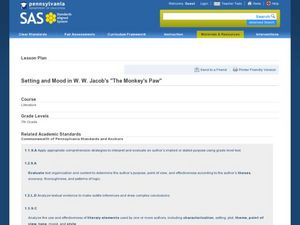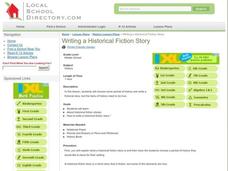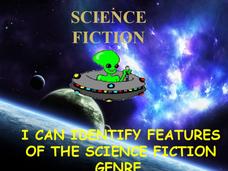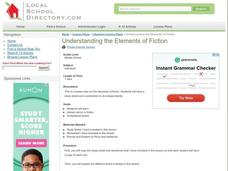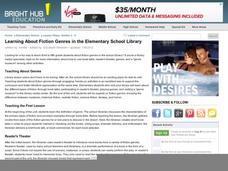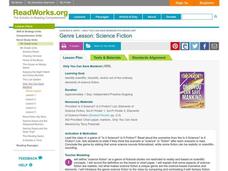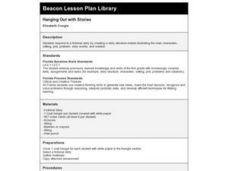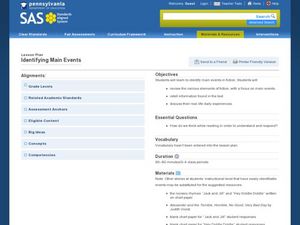Curated OER
Reading Fiction: Analyzing Sentences
Young scholars investigate sentence construction in fiction. In this sentence construction lesson, students examine examples of fiction work and discover why sentences are a certain length. Young scholars create their own passages...
Curated OER
The Importance Setting and Mood in Fiction
Seventh graders examine the setting in pieces of fiction. In this story analysis lesson plan, 7th graders investigate the setting in fictional stories and the importance it has. Students discover new vocabulary terms applying to...
Curated OER
Writing a Historical Fiction Story
What is historical fiction? After explaining the difference to your learners, it's time to give each learner a try! With your support, encourage them to research, plan, and write their own historical fiction story. Don't forget to have a...
Curated OER
Science Fiction
While just a simplistic exploration of the science fiction genre, this presentation provides a unique and creative way to approach this topic. Learners view a series of slides that identify the characteristics of science fiction. This...
Curated OER
Introducing Literary Elements in Fiction
Identify literary elements in fiction. In this reading comprehension lesson, learners read the book Pigsty and record literary elements onto a graphic organizer. They specifically discuss the main characters and events in the text.
Curated OER
Understanding the Elements of Fiction
Inform your class on the elements of fiction: themes, settings, characters, plots, dialogue, narration, flashback, clues, climax, resolution. They write the definitions of the terms on the worksheet provided.l Tip: Have them write a...
Curated OER
Learning About Fiction Genres in the Elementary School Library
Teaching about fiction genres can be challenging. The instructional activity here, designed for library media specialists, offers a fun way to do it. In the instructional activity, learners visit the library and learn about the...
Curated OER
Distinguishing Fiction and Non Fiction
Have your class go on picture walks of different books, and identify them as either fiction or non fiction and why. Working in groups, kindergartners state whether the book tells information or comes from the author's imagination. Use...
Curated OER
Genre Lesson: Science Fiction
Sixth graders explore the components of science fiction in a science and literacy activity. As they define and record definitions of the term on the board, learners identify a text as science fiction using the terms they have listed to...
Curated OER
Drawing Conclusions from Historical Fiction
Students read historical fiction. In this drawing conclusions lesson, students learn how to draw conclusions from text, specifically historical fiction. Students read Molly's Pilgrim and complete a graphic organizer where they answer...
Curated OER
Science Fiction
Do your sixth graders like science fiction? Learn to identify elements of the science fiction genre with a literature lesson. They read from Only You Can Save Mankind and identify the objects, words, and characters from the scenarios....
Curated OER
Satire in Fiction
Twelfth graders identify satire in various fictional texts. In this language arts lesson, 12th graders will learn to define satire, parody, and caricature. Students will identify different forms of satire in historical and modern-day...
Curated OER
Comparing and Contrasting Fiction and Nonfiction
Second graders analyze differences between fiction and nonfiction texts. In this compare and contrast instructional activity, 2nd graders review texts, discuss similarities and differences, and complete a Venn Diagram.
Sharp School
Horror Fiction Multimedia Project
"There comes an end to all things" and ending a study of horror fiction with a multimedia project is "like starting a stone. . . away the stone goes, starting others. . ." In this case, groups start with a question generated by Dr....
Curated OER
Historical Agency in History Book Sets (HBS)
Study historical events by combining the study of historical fiction and non-fiction. Learners read about true past events in historical fiction novels and then research non-fiction accounts of the same events. What are some differences...
Curated OER
Hanging Out with Stories
Help your class listen and respond to a fictional story by creating a story structure mobile illustrating the main characters, setting, plot, problem, story events, and solution. Using a coat hanger, they will create an artistic element...
Curated OER
What is a Make Believe Story?
Explore the concept of make believe stories. In this genres of literature lesson, students discover the difference between realistic fiction and fantasy. They are asked questions during and after the reading of a book to ensure the...
Curated OER
Identifying Main Events
Help kindergartners learn to identify the main events in fiction. They will review elements of fiction, retell information found in the text, and discuss their real-life daily experiences. All the while, they will be asking themselves...
Curated OER
Wagons West!
Through learning about the Oregon Trail and Nebraska, learners evaluate the elements of historical fiction. Coming with a comprehensive bibliography, this lesson has your class learn about settlers traveling along the Oregon Trail,...
Great Schools
A Questionnaire: What Do You Like to Read?
What do your fifth graders know about types of fiction, nonfiction, and poetry? Find out as they fill out this questionnaire that requires them to list authors and texts that exemplify each genre. Not only will you be able to assess what...
Curated OER
Wagons West!
The first pioneers faced many obstacles on their journey west. Middle schoolers read different historical fiction texts (ideas are provided), make connections, and complete a detailed packet (included). Reading guides, journal ideas, and...
Great Schools
Different Types of Writing
What type of writing is this? Learners read a brief introduction to various types of text: instructions, explanations, poems, folk tales, novels, informative, and arguments. The introduction doesn't explain these, so consider going over...
Curated OER
Guided Reading with David's Drawings by Cathryn Falwell
First graders participate in a guided reading lesson. In this guided reading lesson, 1st graders read David's Drawings by Cathryn Falwell, which is a realistic fiction book on the DRA:16 level. They determine the author's message, and...
University of North Carolina
Literature (Fiction)
An informative installment of the Writing for Specific Fields series helps readers learn how to interpret and write about fiction. The website details nine easy steps for writing a literary analysis—a useful method for all readers!
Other popular searches
- Non Fiction
- Historical Fiction
- Science Fiction
- Non Fiction Text Features
- Realistic Fiction
- Fiction and Nonfiction
- Elements of Fiction
- Fiction or Nonfiction
- Non Fiction
- Fictional Narrative
- Non Fiction Writing
- Teaching Historical Fiction



